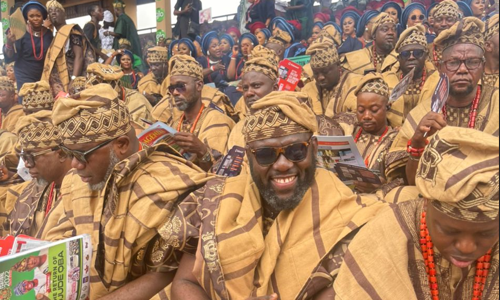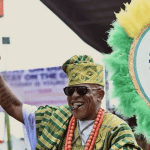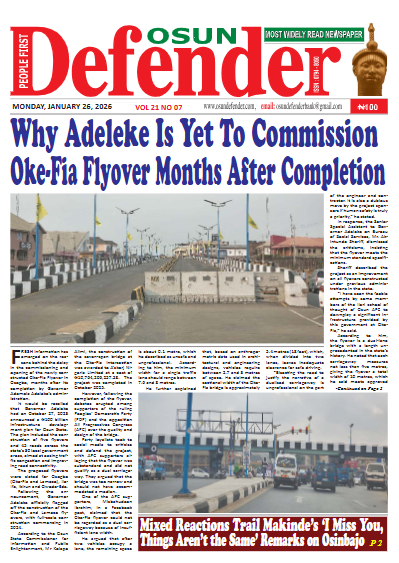How Nigerians Stood United, Displayed Rich Yoruba Culture At 2024 Ojude Oba Festival

The ancient town of Ijebu-Ode in Ogun State recently witnessed a vibrant celebration filled with fanfare, grandeur, and cultural splendor.
The town’s streets came alive as people adorned in various colorful traditional attires gathered to celebrate the Ojude Oba (The King’s Forecourt) Festival on June 18, 2024.
This year, the festival’s theme was “Ojude Oba: Unity and Harmony, Our Gift,” emphasizing the values of togetherness and peace. As always, the festival was held on the third day of Eid-el-Kabir at the pavilion of the Awujale of Ijebuland, Oba Sikiru Adetona.
A key highlight of the festival was the parade of the ‘Regberegbe,’ the age groups known for their elaborate and vibrant displays. These parades are a cornerstone of the event, showcasing the community’s rich cultural heritage through colorful dances and traditional attire.
Over 90 age groups participated in the parade, each group displaying their unique cultural attire. The Balogun Kuku family stood out and won the parade for the eighth consecutive year. Their impressive performance earned them a cash prize of N500,000, sponsored by Globacom Nigeria, a longstanding supporter of the festival.
READ: How PDP Will Resolve Internal Crisis Ahead Of 2027 Election – Atiku
The festival also featured a variety of other captivating activities. Among them was a horse known for its impressive dancing skills, which became a major attraction. The horse’s rhythmic movements to the beat of the drums delighted the crowd, adding an extra layer of excitement to the festivities.
Throughout the event, the Awujale of Ijebuland, Oba Sikiru Adetona, observed the proceedings with regal poise. His presence added a sense of tradition and authority to the celebrations, reinforcing the cultural significance of the festival.
The Ojude Oba Festival attracted notable guests from various sectors. Among them was Olutoyin Okeowo, the Chief Executive Officer of Metropolitan Motors Limited, who joined in the celebrations.
Also in attendance was Ladi Balogun, the Group Chief Executive Officer of FCMB Group Plc. His presence highlighted the festival’s wide appeal and the importance of corporate involvement in cultural events.
Prof. Oluwatoyin Ashiru, Non-Executive Director of FCMB Group, was another distinguished guest. His participation underscored the festival’s role in fostering community ties and celebrating shared heritage.
Former governor and current Senator representing Ogun East Senatorial District, Gbenga Daniel, was also present. His attendance emphasized the festival’s importance in the state’s cultural calendar.
The event was further enriched by the presence of veteran fuji musician Wasiu Ayinde, also known as K1 De Ultimate. His performance added a musical dimension to the festival, resonating with attendees of all ages.
Celebrities such as Femi Branch and Wumi Toriola were among the guests, adding a touch of glamour to the cultural event. Their participation helped bridge the gap between tradition and contemporary popular culture.
The 2024 Ojude Oba Festival in Ijebu-Ode was a spectacular celebration of culture, unity, and community, bringing together people from various walks of life to honor their shared heritage.
While speaking, Ogun State Governor, Dapo Abiodun emphasised his administration’s dedication to elevating the Ojude Oba festival to a global scale, highlighting that the event is not just a cultural heritage for the people of Ijebuland but has also become a major attraction for both local and international tourists.
He noted that the festival showcases Ogun State’s hospitality and the rich traditions of Ijebuland to audiences nationwide and worldwide.
He said, “This festival serves as a symbol of our unity, tourism and a rallying point to all the Ijebu sons and daughters to celebrate our tradition, culture, and revered monarch.”
Meanwhile, the Federal Government has announced plans to list the festival as one backed by UNESCO.
The Minister of Culture, Arts, and Creative Economy, Hannatu Musa-Musawa, who was represented by the Director of Cultural Agencies and Heritage, Ben Anama, noted that the annual festival was a platform for fostering the unity of the country, and one of the country’s tourism potentialities, adding that Nigeria could tap into it to diversify the economy from oil, and generate more resources.
The festival is known to boost the local economy by attracting thousands of visitors, which in turn benefit businesses, artisans and vendors.
The festival began in the late 19th century as a small gathering of Muslim converts, who wanted to thank the Awujale for allowing them practice their religion freely. Over time, it has grown into a major event.

Sodiq Lawal is a passionate and dedicated journalist with a knack for uncovering captivating stories in the bustling metropolis of Osun State and Nigeria at large. He has a versatile reporting style, covering a wide range of topics, from politics , campus, and social issues to arts and culture, seeking impact in all facets of the society.









